43 lipids on food labels
How to Understand and Use the Nutrition Facts Label | FDA - U.S. Food ... You can use the label to support your personal dietary needs - look for foods that contain more of the nutrients you want to get more of and less of the nutrients you may want to limit. Nutrients... How To Read Food and Beverage Labels - National Institute on Aging Although frozen and canned fruits and vegetables have food labels, fresh varieties often do not. You can find nutrition information for fresh vegetables and fruits on the USDA website. Or you can call the U.S. Department of Agriculture's Food and Nutrition Information Center at 301-504-5414. Understanding percent Daily Value (% DV)
Learning To Read Labels :: Diabetes Education Online On a nutrition food label, subtract the fiber from the total carbohydrate amount. When you read food labels, the grams of sugar are already included in the total carbohydrate amount, so you do not need to count this sugar amount separately. The grams of sugar listed include both natural sugars, from fruit or milk, and added sugars.
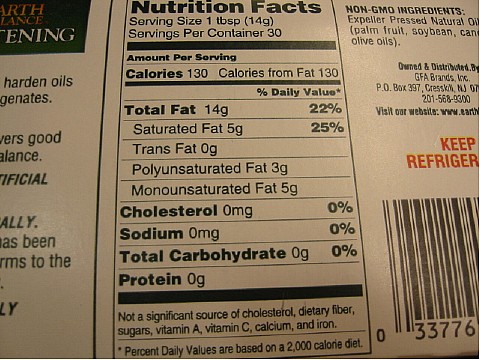
Lipids on food labels
How to Find Lipids on Food Labels | Healthy Living How to Find Lipids on Food Labels by Sandi Busch Updated September 30, 2017 The nutrition facts panel describes the amount of total fat, or lipids, and the types of fats you'll get from one... How to Read the Nutrition Facts Label on Packaged Foods - WebMD Most of it is in packaged foods and restaurant items. Limit salt to 2,300 milligrams (about 1 teaspoon) daily. If you have high blood pressure, kidney disease, or diabetes, or are African-American... Should I check the cholesterol on nutrition labels? Major dietary cholesterol contributors — meat, fish, and chicken — often have no label. Having less than 4-6 oz of those per day and less than 2-4 eggs per week will generally keep your cholesterol reasonable. And that's a smart idea anyhow, to leave room for more artery-friendly fruits, veg, whole grains, beans, nuts, seeds, etc."
Lipids on food labels. 6 Foods High in Lipids and Why You Should Avoid - WebMD Lipids can be both solid or liquid at room temperature, in which case they are called fats or oils, respectively. For several decades, fats were considered bad for your health, and low-fat foods... The nutrition facts label on a food package lists "iron 50%." what does ... To calculate this, divide the calories from fat in a food or drink by the total calories (found on the product's food label) and multiply by 100. Divide 60 by 300 and multiply by 100 if a 300-calorie item has 60 calories from fat. What exactly is written on a label? Food Labels | CDC - Centers for Disease Control and Prevention If you eat the whole thing, you are eating 8 times the amount of calories, carbs, fat, etc., shown on the label. Total Carbohydrate shows you types of carbs in the food, including sugar and fiber. Choose foods with more fiber, vitamins, and minerals. Choose foods with lower calories, saturated fat, sodium, and added sugars. Avoid trans fat. Reading Food Labels | ADA - American Diabetes Association Put food labels to work. The Nutrition Facts labels on foods are really the key to making the best choices. We'll cover the basics so that these labels make shopping easier for you. You've heard it all. From carb-free to low-carb, to whole and empty carbs, it's hard to know what it all means. Blood sugar highs and lows aren't always ...
Lipids - Nutrition Essentials - Maricopa 1) Triglycerides make up more than 95 percent of lipids in the diet and are commonly found in fried foods, butter, milk, cheese, and some meats. Naturally occurring triacylglycerols are found in many foods, including avocados, olives, corn, and nuts. We commonly call the triglycerides in our food "fats" and "oils." The Science Behind Calories and Nutrition Facts Labels These main nutrients are fats ( lipids ), proteins and carbohydrates. Some calories you consume every day should come from each of the three nutrients. About 50 to 60% of your calories should come from carbohydrates, 30% of your calories should come from fat and 12 to 20% of your calories should come from proteins (©2020 Let's Talk Science ... Food Labels | Nutrition.gov What's New with the Nutrition Facts Label. HHS, Food and Drug Administration. The U.S. Food and Drug Administration (FDA) has updated the Nutrition Facts label on packaged foods and beverages with a fresh design that will make it easier for you to make informed food choices that contribute to lifelong healthy eating habits. What's in a Name? Current Analytical Techniques for Food Lipids - University of Nebraska ... Food lipids are broadly divided into categories of fats and oils based on origin of the lipid substance and its physical state at room temperature. ... the FDA authority to regulate health claims on food labels and in food labeling [3]. Under provisions o f the NLEA, declarations for the content o f ...
Food Labeling & Nutrition | FDA Food labeling is required for most prepared foods, such as breads, cereals, canned and frozen foods, snacks, desserts, drinks, etc. Nutrition labeling for raw produce (fruits and vegetables) and... 1.2.1. Learning From Food Labels - Concordia University To know this amount in grams of fat, read the footnote of the food label to find that the recommended maximum amount of fat grams to consume per day for a 2,000 kilocalories per day diet is 65 grams. Eighteen percent of sixty-five equals about 12 grams. This means that 53 grams of fat are remaining in your fat allowance. Understanding Food Labels - The Nutrition Source Understanding Food Labels. The information on food labels is intended to help consumers become savvy about their food choices. The front, back, and sides of a package are filled with information to inform us what the food contains and to provide guidance in making healthier selections of processed foods. However, all the numbers, percentages ... Reading Food Labels (for Parents) - Nemours KidsHealth Food labels must include the ingredients that are in the product, listed in order of how much of the ingredient the food contains. Food-makers are required to clearly state on food labels whether the product contains these common food allergens: peanuts, tree nuts, milk, egg, fish, shellfish, soy, and wheat.
Interpreting Total Fat and Types of Fat on Food Labels - Nina Cherie ... Now, at the end of the day, since all high-fat foods tend to drive up calorie counts, it's typically recommended that you limit your intake of total fat to 25-35% of your daily calories. Of this amount, saturated fats and trans fats should comprise less than 7-10% and no more than 1%, respectively. At the very least, following these ...
Food Labels Guide & Examples | How to Read Nutrition Labels - Video ... Food labels are read most easily from top to bottom and left to right. From top to bottom, food labels identify the following information: Servings per container and serving sizes. Calories per ...
What types of lipids must be listed on food labels? - Answers A & C Vitamin must be listed on food labels. Companies can voluntarily list other vitamins that are present in the food on the labels as well. When vitamins are added to the food, or when a ...
Lipids and the Food Industry - Human Nutrition - University of Hawaiʻi Labeling laws allow foods containing trans fat to be labeled "trans-fat free" if there are fewer than 0.5 grams per serving. This makes it possible to eat too much trans fat when you think you're not eating any at all because it is labeled trans-fat free. Always review the label for trans fat per serving.
Food Labels: Fat & Cholesterol | Home & Garden Information Center Food labels contain clues to a food's fat and cholesterol content, including the amount per serving. Compare similar foods and select the one with the smallest amounts of fat and cholesterol. Two important parts of a food label are the "Nutrition Facts" panel, which contains nutrition information, and the ingredients list.
Understanding Food Labels - Nutrition: Science and Everyday Application ... The FDA uses the following definitions for interpreting the %DV on food labels:4 5%DV or less means the food is low in a nutrient. 10% to 19%DV means the food is a "good source" of a nutrient. 20%DV or greater means the food is high in a nutrient.
5 Understanding Food Labels and Health Claims - Maricopa This label is called a Nutrition Facts panel, which gives information on the number of servings per container, the number of calories per serving, and certain nutrients. Specifically, it lists the macronutrients and four of the most important micronutrients people need to pay special attention to, such as Vitamin D, Calcium, Iron, and potassium.
Food Labels: Carbohydrates | Home & Garden Information Center The 2015 Dietary Guidelines for Americans makes the following recommendations about daily consumption of unrefined carbohydrate foods, based on a 2,000-calorie diet: Choose fiber-rich fruits, vegetables, and whole grains often. 6 ounces of grain products, with at least half of this amount being whole grain products 2 ½ cups vegetables
Chapter 2 Flashcards | Quizlet Study with Quizlet and memorize flashcards containing terms like So far, the DRI Committee has published recommendations for the vitamins and minerals, along with those for carbohydrates, fiber, lipids, proteins, water, and energy. a. True b. False, On average, one should try to get 100% of the DRI for every nutrient to ensure an adequate intake over time. a. True b. False, Nutrient contents ...
Food labels and their effects on consumers - The Journalist's Resource Studies reporting homogeneous outcomes were pooled together and analyzed through meta‐analyses. Publication bias was evaluated with a funnel plot. Food labelling would increase the amount of people selecting a healthier food product by about 17.95 percent (confidence interval: +11.24 percent to +24.66 percent).
Should I check the cholesterol on nutrition labels? Major dietary cholesterol contributors — meat, fish, and chicken — often have no label. Having less than 4-6 oz of those per day and less than 2-4 eggs per week will generally keep your cholesterol reasonable. And that's a smart idea anyhow, to leave room for more artery-friendly fruits, veg, whole grains, beans, nuts, seeds, etc."
How to Read the Nutrition Facts Label on Packaged Foods - WebMD Most of it is in packaged foods and restaurant items. Limit salt to 2,300 milligrams (about 1 teaspoon) daily. If you have high blood pressure, kidney disease, or diabetes, or are African-American...
How to Find Lipids on Food Labels | Healthy Living How to Find Lipids on Food Labels by Sandi Busch Updated September 30, 2017 The nutrition facts panel describes the amount of total fat, or lipids, and the types of fats you'll get from one...

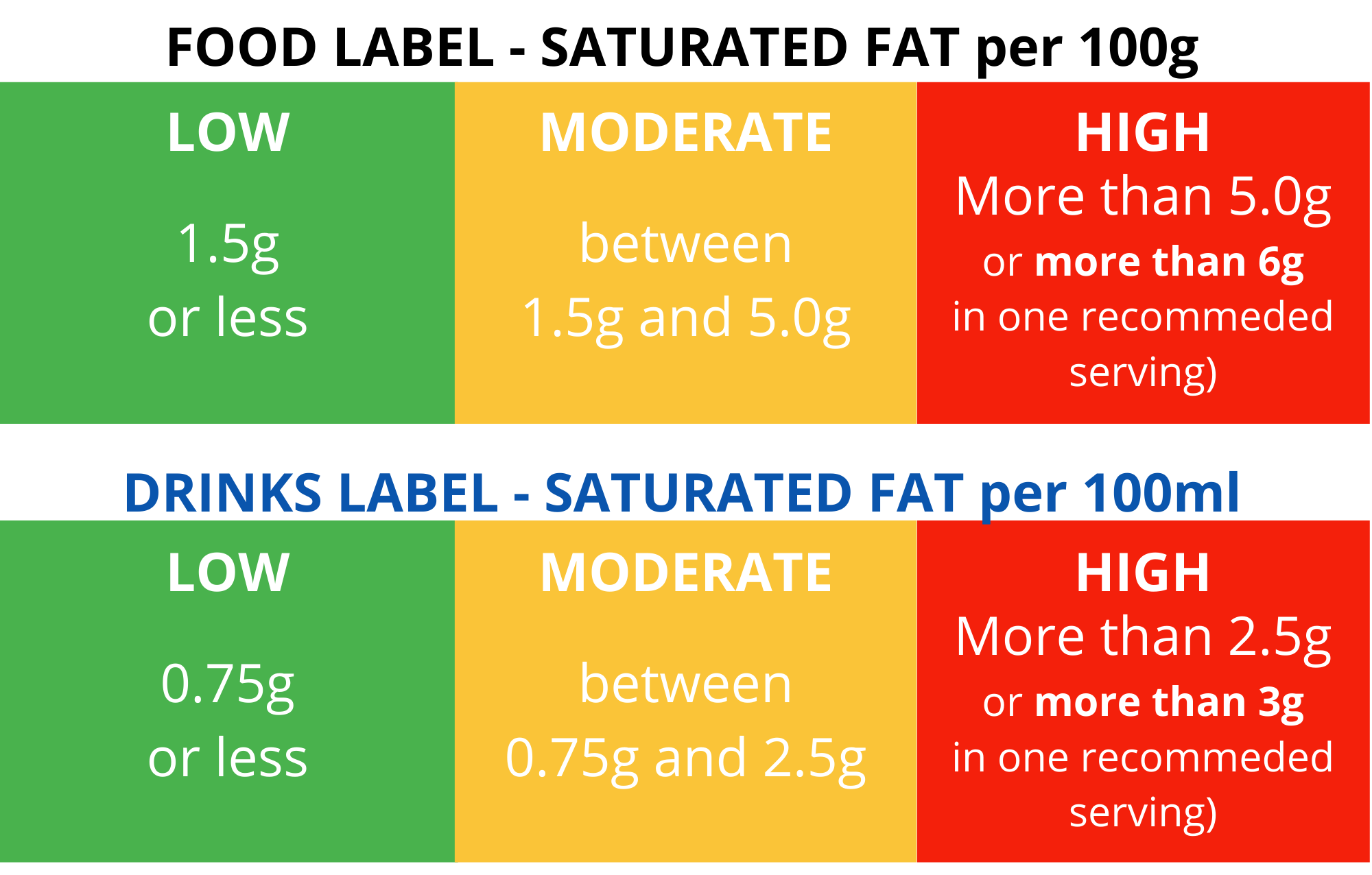

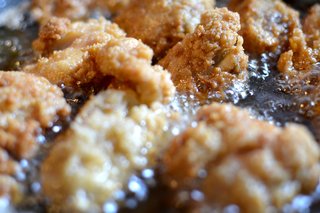

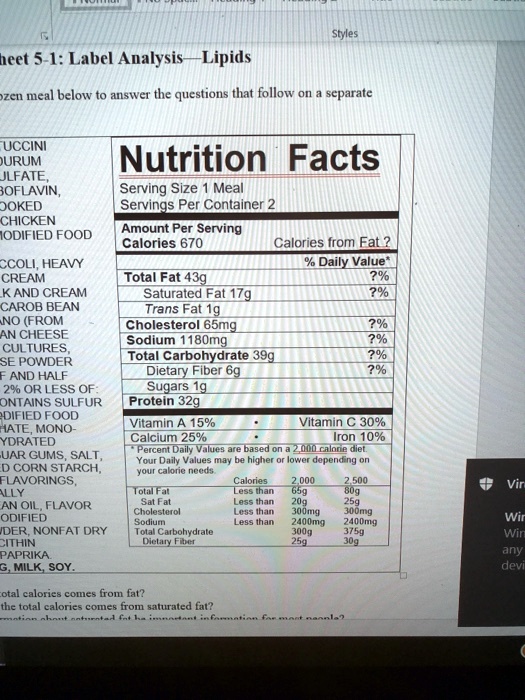



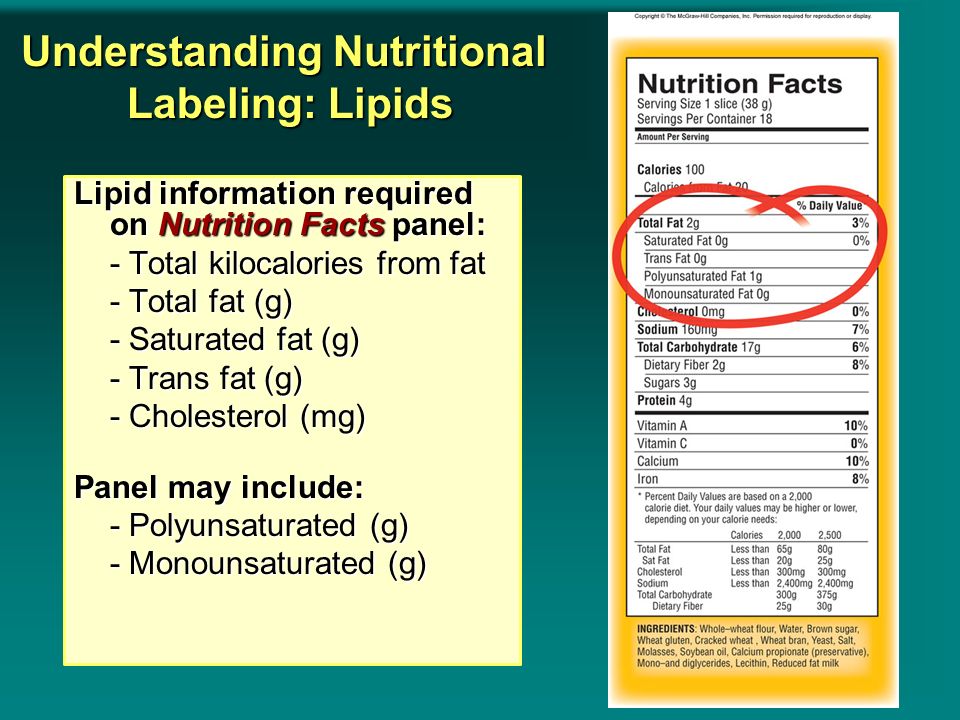

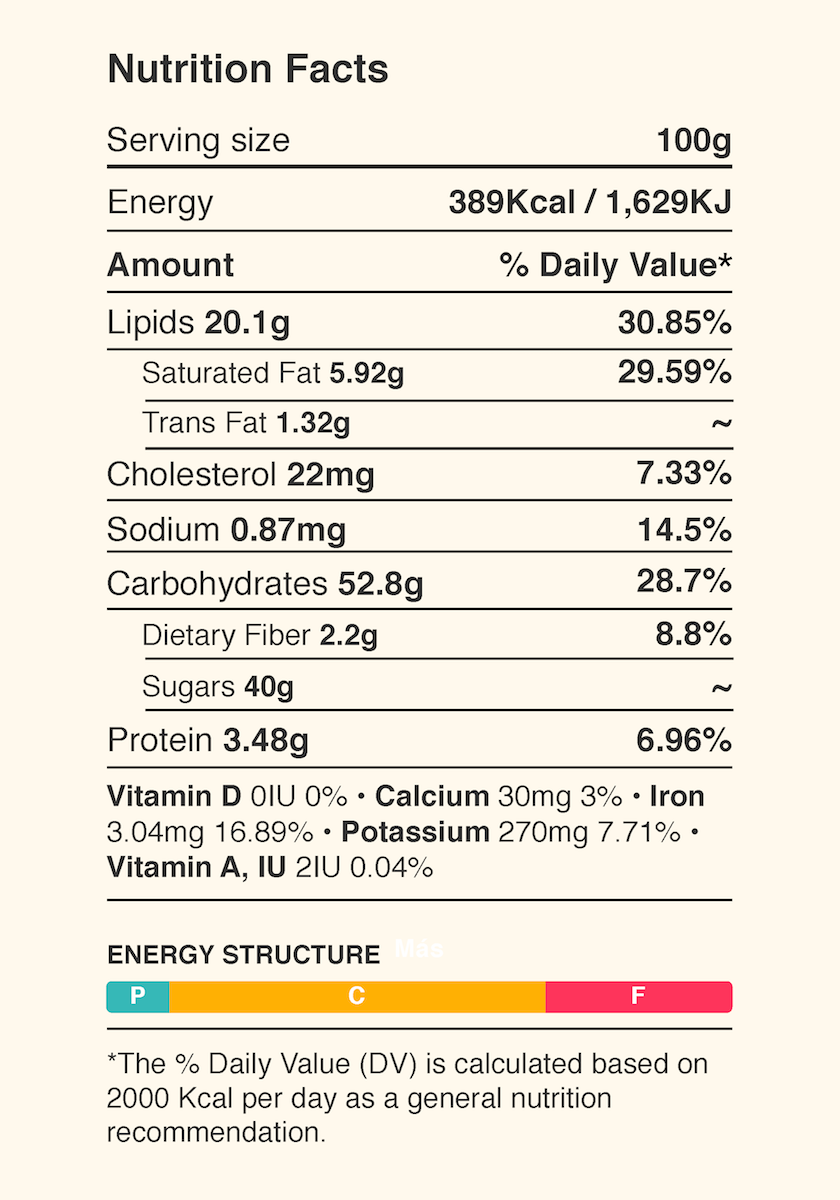
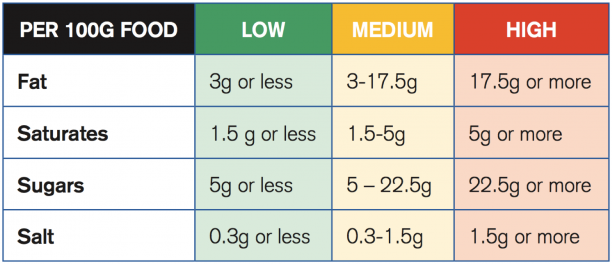

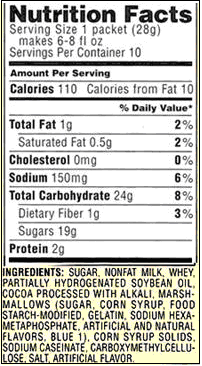



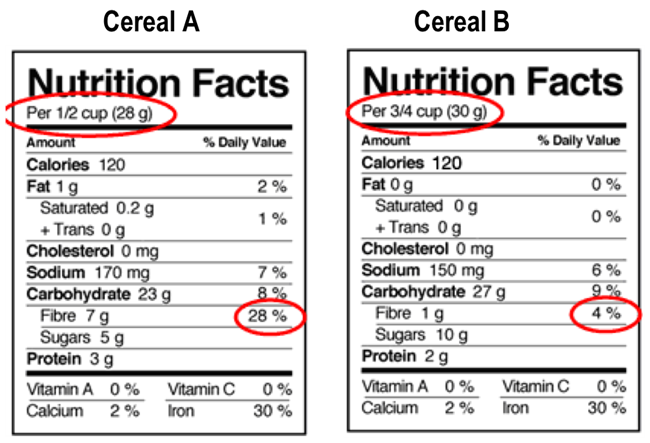

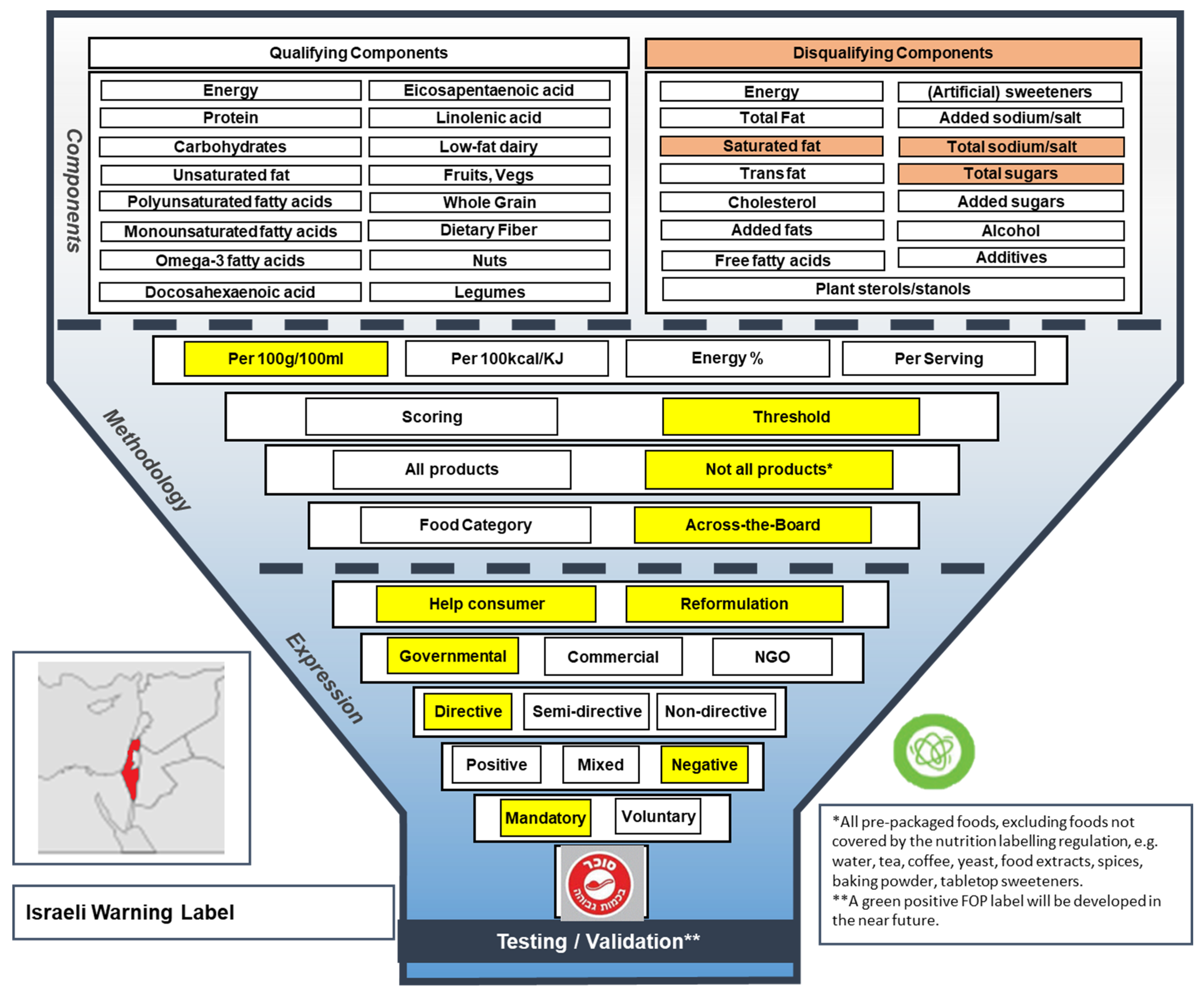
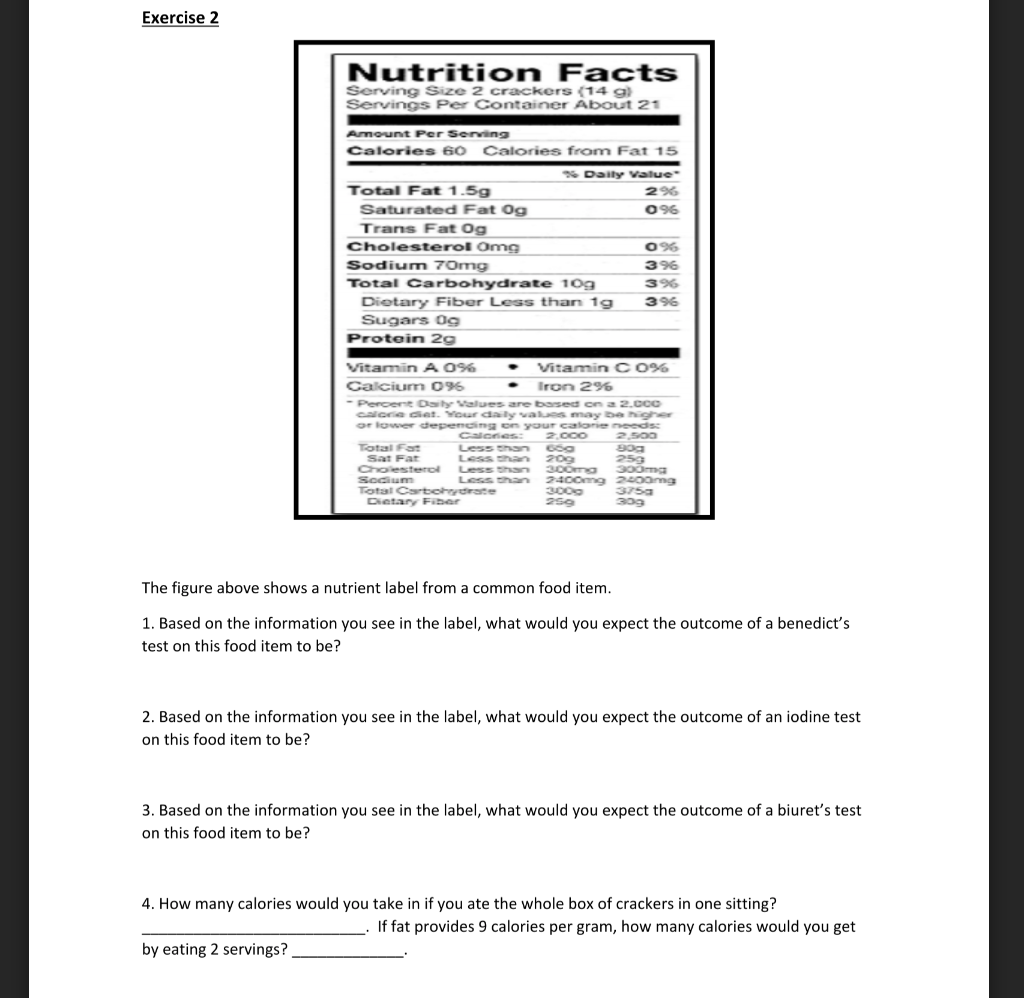

/Healthy-Fats-Food-GettyImages-1301412044-2000-8ab23a10624d42df85fa3f37d7c76a6b.jpg)




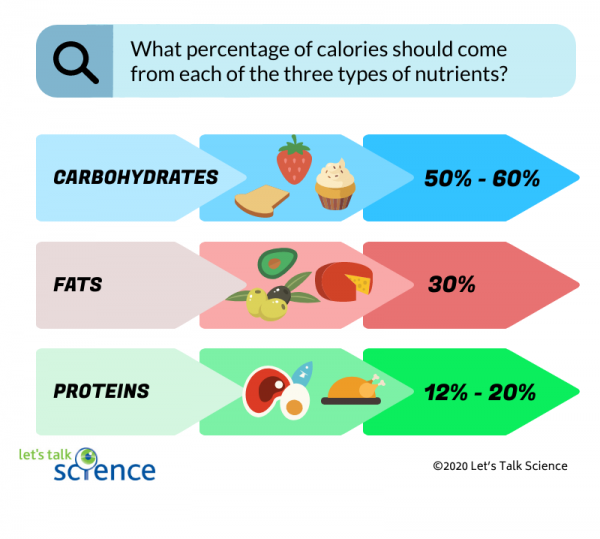








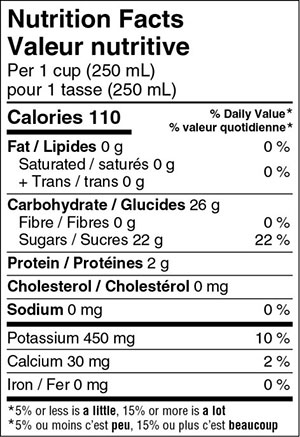
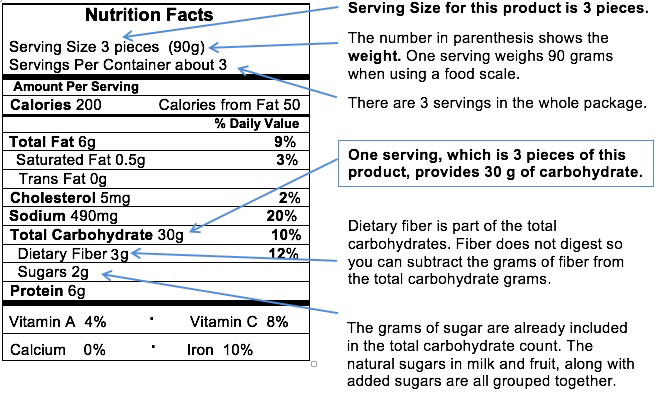
Post a Comment for "43 lipids on food labels"